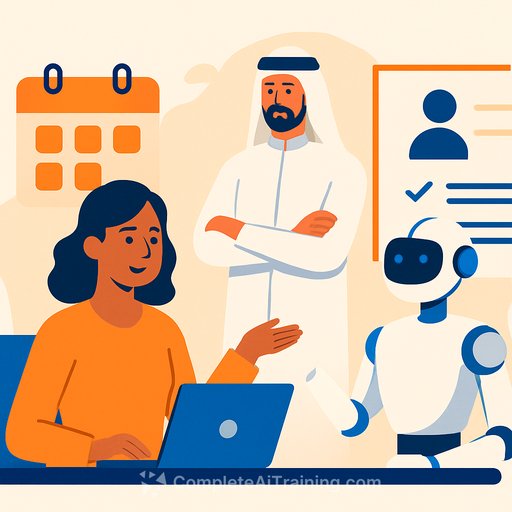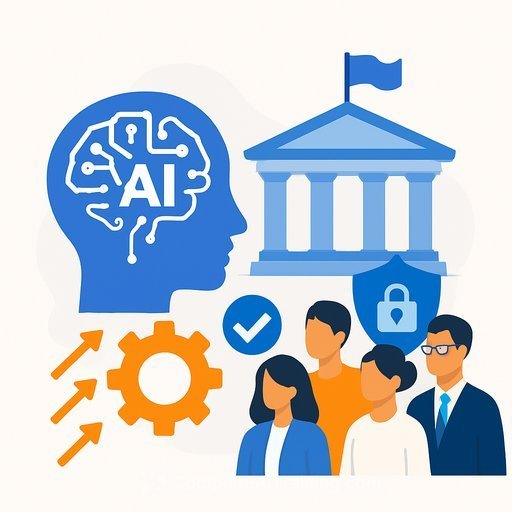Will AI Replace HR Jobs in Qatar? What to Do in 2025
TL;DR: AI won't replace HR wholesale in Qatar by 2025, but it will reshape the work. Expect routine tasks to be automated, cutting admin time by ~50% and talent-management time by roughly a third. About 24% of HR roles and 58% of headcount will be disrupted. The winners: teams that reskill, govern AI use, and require Arabic support in tools and SLAs.
Last updated: September 13, 2025
Table of Contents
- What AI Can and Cannot Replace in Qatar HR
- What HR Leaders in Qatar Should Expect in 2025
- High-Risk HR Activities and Roles in Qatar
- Roles and Skills Qatari HR Professionals Should Focus On
- Concrete 10-Step Action Plan for Qatari Employers and HR in 2025
- AI Governance, Ethics and Risk Management in Qatar
- Local and Regional Resources to Help HR in Qatar Reskill and Audit AI
- Case Studies and Examples Relevant to Qatar
- Next Steps and Checklist for HR Leaders in Qatar
- Frequently Asked Questions
What AI Can and Cannot Replace in Qatar HR
AI is strong at repetitive, rules-based work. Think CV screening, interview scheduling, payroll validation, document OCR, and data entry. Predictive models can flag retention risks or high-cost claims. Generative tools can draft job descriptions and policies. Local HRIS and onboarding automations can cut time-to-productivity by about 50%.
AI cannot replace culturally informed judgement, sensitive employee relations, ethical oversight, and the design of inclusive Qatarization and DE&I programs. The move is clear: automate the grunt work, keep people at the center, and enforce governance with Arabic support and service levels that match local needs.
Quote: "By understanding how AI affects the workforce, HR can better prepare everyone for changes to come." - Aon
What HR Leaders in Qatar Should Expect in 2025
2025 is the year of practical acceleration. Hybrid work is standard. AI shifts from pilots to production. Skills-based hiring gains ground. Expect tighter HR-IT collaboration to secure data, stand up Arabic-capable tools, and move from experiments to business outcomes.
- Remote/hybrid roles grew ~25% (2023-24). Flexibility is a retention lever.
- AI impact in Qatar: ~$5bn and ~13,000 jobs by 2030.
- Qataris are ~11.6% of the population in 2025, keeping local talent development front and center.
Plan for stronger demand in energy, healthcare, and construction. Use dashboards, not paper stacks. Treat skills as the unit of work, not just roles.
Quote: "In 2025, the swing back to the human element will be the most important trend in talent acquisition." - Steve Knox, Dayforce
High-Risk HR Activities and Roles in Qatar
Risk clusters where repetitive processing meets sensitive data and regulation. Prioritise tight controls for:
- Payroll and WPS-compliant salary runs
- Benefits operations and health-claims modeling
- Mass onboarding/offboarding and document-heavy admin
- CV screening, data entry, and payroll validation
- Any integration with ERP/HRIS
Research points to disruption for ~24% of HR roles and ~58% of headcount. The biggest risk is not just displacement-it's weak implementations that leak data or create bias. Treat pay, benefits, and compliance automations as high-stakes projects with Arabic support and clear SLAs.
Roles and Skills Qatari HR Professionals Should Focus On
Build a practical mix of governance, technical literacy, and human skills:
- Data and people-analytics literacy
- Prompt-writing and prompt-risk awareness
- Model explainability and vendor/procurement savvy (Arabic support, SLAs)
- Cybersecurity basics for HR data
- Empathy, change leadership, complex employee relations
Map processes to support Arabic recruiting workflows and Qatarization checks. Embed human oversight, audit trails, and ethics reviews based on MCIT guidance. The outcome: safer analytics, smarter hiring, and HR as a strategic partner.
Concrete 10-Step Action Plan for Qatari Employers and HR in 2025
- Inventory high-risk HR AI use cases and data flows.
- Match policies to Qatar's national AI framework; make governance a day-one requirement.
- Classify payroll, benefits, and health data; apply strict data controls.
- Require Arabic support and firm vendor SLAs in every HR tech purchase.
- Build human-in-the-loop checks, explainability, and audit trails into hiring and payroll automations.
- Run small sandboxes, then pilot with HR-IT co-ownership.
- Reskill by role: data literacy, prompts, vendor management, and change leadership.
- Apply strong privacy and cybersecurity for cloud/HRIS workloads.
- Adopt third-party governance checklists and model-risk reviews.
- Measure, report, and iterate; treat AI audits like a heartbeat monitor for trust.
AI Governance, Ethics and Risk Management in Qatar
Move from checklists to continuous control. Bias testing, transparency, and vendor accountability should be standard. External examples such as New York City's Local Law 144 require annual bias audits for automated hiring tools-use that bar as a guide for contracts and internal practice.
Practical moves:
- Contract independent bias audits; re-audit after material model changes.
- Set up continuous monitoring and dashboards, not annual-only reviews.
- Publish internal summaries so issues are visible early.
Helpful reads: IMF analysis on AI and work and SHRM on NYC Local Law 144.
Local and Regional Resources to Help HR in Qatar Reskill and Audit AI
Leverage national investments in cloud and AI research hubs for Arabic-language pilots. Universities and local consultancies are building curricula and hands-on programs focused on ethical deployment, change management, and vendor-aware implementations.
Combine short modular courses, role-based pathways, and independent vendor audits. Start small, measure outcomes, and scale what works.
Need structured options for teams? Browse curated learning paths on Complete AI Training by job role or see the latest AI courses.
Case Studies and Examples Relevant to Qatar
Global programs point to a steep rise in AI-enabled workflows by the end of 2025. Internal HR agents have been shown to answer more than nine in ten requests, freeing teams to focus on strategy, not forms.
What to copy: pilot Arabic-capable agents, secure data foundations, and insist on SLAs that define accuracy, uptime, escalation paths, and audit rights. Treat deployment as a process redesign, not a plugin.
Quote: "This isn't about plugging an agent into an existing process and hoping for the best. It means re-architecting how the process is executed." - Francesco Brenna, IBM Consulting
Next Steps and Checklist for HR Leaders in Qatar
- 0-3 months: Map high-risk workflows (payroll, benefits, onboarding). Create a vendor SLA checklist with Arabic support, bias audit terms, data residency, and incident response.
- 3-9 months: Run Arabic-capable pilots. Mandate independent bias audits and human review gates. Stand up monitoring dashboards.
- 9-18 months: Reskill HR with role-based training. Redesign processes where automation shows clear gains. Re-audit after model updates.
Program Spotlight: AI Essentials for Work
Length: 15 weeks
Courses: AI at Work: Foundations; Writing AI Prompts; Job-Based Practical AI Skills
Early-bird cost: $3,582
This type of program helps HR teams build prompt skills, practical AI fluency, and vendor-aware judgement-fast.
For alternatives and add-ons, explore role-based picks on Complete AI Training and practical prompt courses under Prompt Engineering.
Frequently Asked Questions
Will AI replace HR jobs in Qatar?
Wholesale replacement is unlikely in 2025, but the work will shift fast. Expect strong productivity gains and visible disruption: ~24% of HR roles and ~58% of headcount affected. Routine work will shrink; human-centred work grows in value.
Which HR tasks in Qatar are most likely to be automated and which stay human-led?
Automated: CV screening, scheduling, payroll validation, OCR/data entry, mass onboarding workflows, standard benefits checks, and predictive risk flags. Human-led: sensitive employee relations, Qatarization and DE&I design, ethics, and legal interpretation.
What should HR leaders in Qatar do in 2025?
Map high-risk use cases and data flows, require Arabic support and tight SLAs, embed human oversight and audits, run sandboxes then pilots, reskill by role, protect payroll/health data, and monitor continuously.
Which roles and skills should Qatari HR professionals prioritise?
People analytics, prompt-writing, model explainability, vendor/procurement know-how, cybersecurity basics, empathy, and change leadership. Pair with process redesign so automation boosts strategy.
How should organisations govern high-risk HR AI projects?
Treat payroll, benefits, and HRIS/ERP-connected systems as high-risk. Use independent bias audits, re-audit after model changes, keep humans in the loop, and enforce privacy and security. Map policies to MCIT guidance and the national AI framework.
Final note
AI won't take HR's seat in Qatar. It will clear the desk. Use the time you get back to build skills, strengthen governance, and deliver a people strategy that compounds.
Your membership also unlocks:






